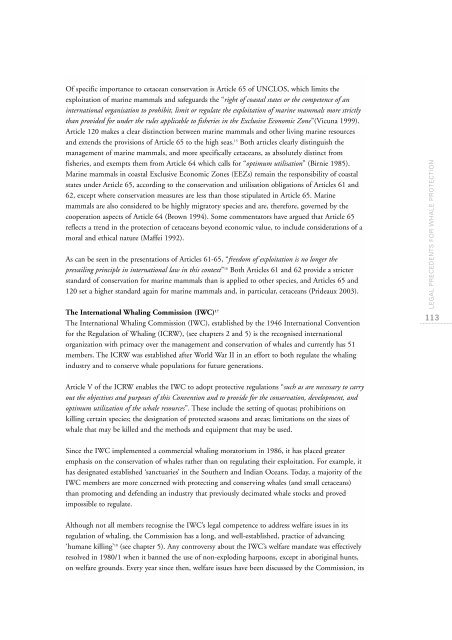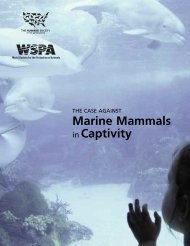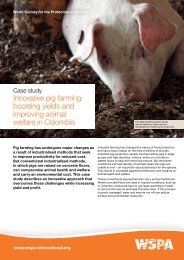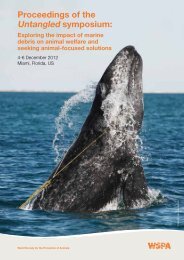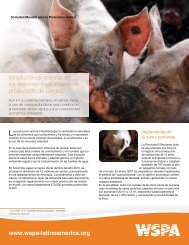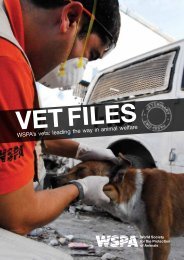TROUBLED WATERS - Whale and Dolphin Conservation Society
TROUBLED WATERS - Whale and Dolphin Conservation Society
TROUBLED WATERS - Whale and Dolphin Conservation Society
- No tags were found...
You also want an ePaper? Increase the reach of your titles
YUMPU automatically turns print PDFs into web optimized ePapers that Google loves.
Of specific importance to cetacean conservation is Article 65 of UNCLOS, which limits theexploitation of marine mammals <strong>and</strong> safeguards the “right of coastal states or the competence of aninternational organisation to prohibit, limit or regulate the exploitation of marine mammals more strictlythan provided for under the rules applicable to fisheries in the Exclusive Economic Zone”(Vicuna 1999).Article 120 makes a clear distinction between marine mammals <strong>and</strong> other living marine resources<strong>and</strong> extends the provisions of Article 65 to the high seas. 15 Both articles clearly distinguish themanagement of marine mammals, <strong>and</strong> more specifically cetaceans, as absolutely distinct fromfisheries, <strong>and</strong> exempts them from Article 64 which calls for “optimum utilisation” (Birnie 1985).Marine mammals in coastal Exclusive Economic Zones (EEZs) remain the responsibility of coastalstates under Article 65, according to the conservation <strong>and</strong> utilisation obligations of Articles 61 <strong>and</strong>62, except where conservation measures are less than those stipulated in Article 65. Marinemammals are also considered to be highly migratory species <strong>and</strong> are, therefore, governed by thecooperation aspects of Article 64 (Brown 1994). Some commentators have argued that Article 65reflects a trend in the protection of cetaceans beyond economic value, to include considerations of amoral <strong>and</strong> ethical nature (Maffei 1992).As can be seen in the presentations of Articles 61-65, “freedom of exploitation is no longer theprevailing principle in international law in this context” 16 Both Articles 61 <strong>and</strong> 62 provide a stricterst<strong>and</strong>ard of conservation for marine mammals than is applied to other species, <strong>and</strong> Articles 65 <strong>and</strong>120 set a higher st<strong>and</strong>ard again for marine mammals <strong>and</strong>, in particular, cetaceans (Prideaux 2003).The International Whaling Commission (IWC) 17The International Whaling Commission (IWC), established by the 1946 International Conventionfor the Regulation of Whaling (ICRW), (see chapters 2 <strong>and</strong> 5) is the recognised internationalorganization with primacy over the management <strong>and</strong> conservation of whales <strong>and</strong> currently has 51members. The ICRW was established after World War II in an effort to both regulate the whalingindustry <strong>and</strong> to conserve whale populations for future generations.LEGAL PRECEDENTS FOR WHALE PROTECTION113Article V of the ICRW enables the IWC to adopt protective regulations “such as are necessary to carryout the objectives <strong>and</strong> purposes of this Convention <strong>and</strong> to provide for the conservation, development, <strong>and</strong>optimum utilization of the whale resources”. These include the setting of quotas; prohibitions onkilling certain species; the designation of protected seasons <strong>and</strong> areas; limitations on the sizes ofwhale that may be killed <strong>and</strong> the methods <strong>and</strong> equipment that may be used.Since the IWC implemented a commercial whaling moratorium in 1986, it has placed greateremphasis on the conservation of whales rather than on regulating their exploitation. For example, ithas designated established ‘sanctuaries’ in the Southern <strong>and</strong> Indian Oceans. Today, a majority of theIWC members are more concerned with protecting <strong>and</strong> conserving whales (<strong>and</strong> small cetaceans)than promoting <strong>and</strong> defending an industry that previously decimated whale stocks <strong>and</strong> provedimpossible to regulate.Although not all members recognise the IWC’s legal competence to address welfare issues in itsregulation of whaling, the Commission has a long, <strong>and</strong> well-established, practice of advancing‘humane killing’ 18 (see chapter 5). Any controversy about the IWC’s welfare m<strong>and</strong>ate was effectivelyresolved in 1980/1 when it banned the use of non-exploding harpoons, except in aboriginal hunts,on welfare grounds. Every year since then, welfare issues have been discussed by the Commission, its


